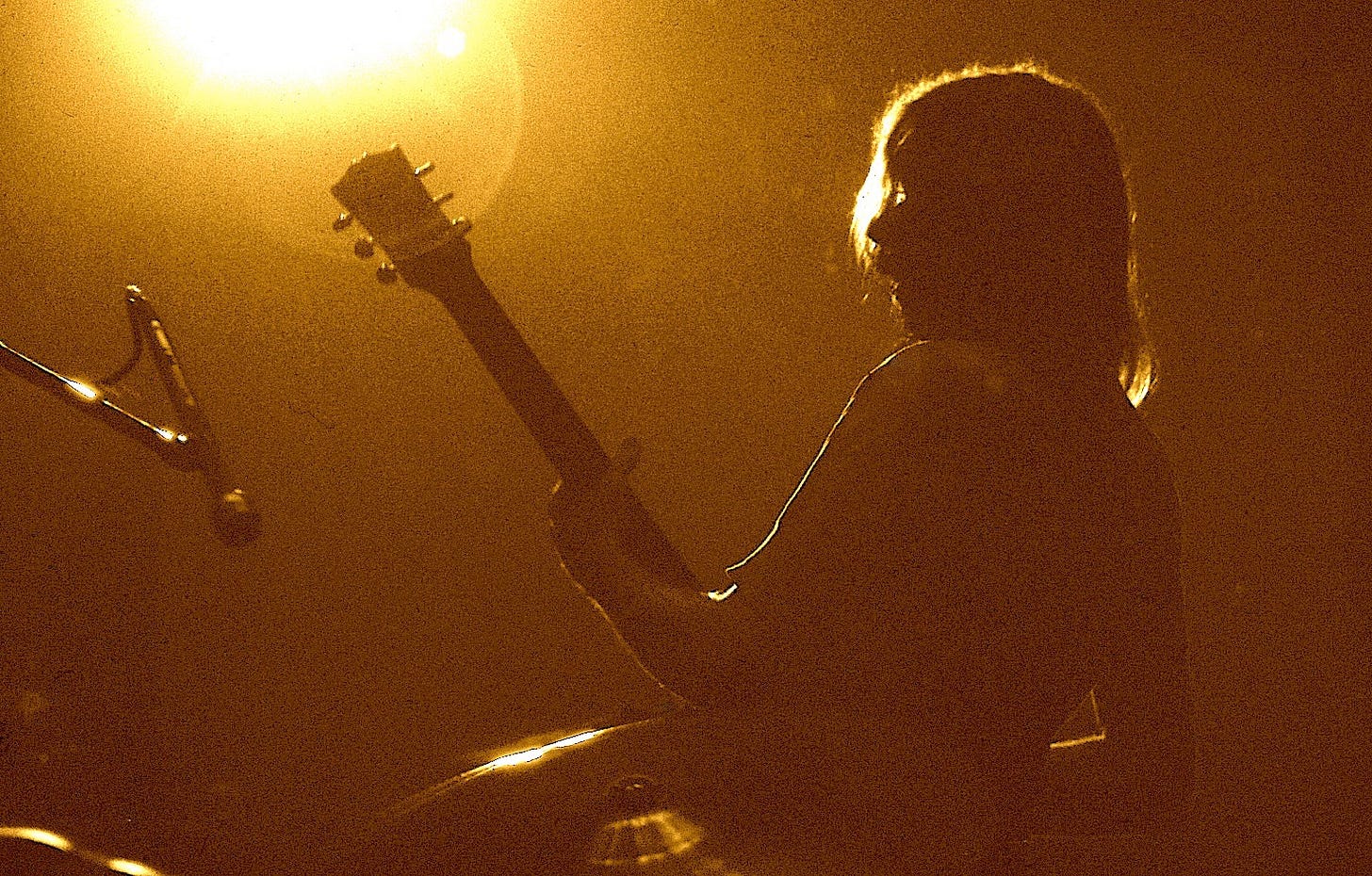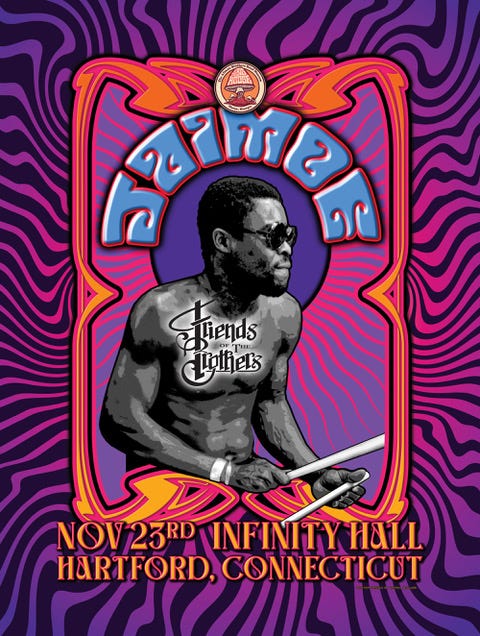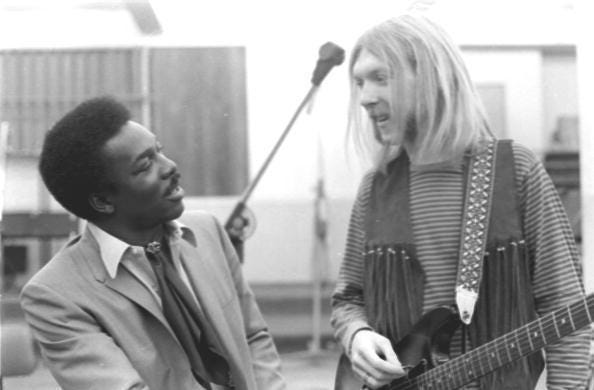Exploring Duane Allman's remarkable longevity on his 78th birthday.
By creating a band that was larger than himself, Duane Allman guaranteed his own immortality. There's a lesson here that extends far beyond music.
“Duane had so much technique, but it never got in the way of his inspiration. He could walk into anyone’s session, any kind of music, and make it better. And he didn’t have to do it by blowing a hot solo. Any time you added him to a situation, it got better. Duane was an innovator and he would have been doing amazing things if he were still with us. He would not be sitting still. He would not be playing the same blues he did on Fillmore… or there would be a lot more to go with it.”
-Johnny Sandlin to Kirk West, 1983
If you enjoy, please share, and please subscribe. This is a word of mouth operation - and always free!
Howard Duane Allman (November 20, 1946 - October 29, 1971)
Duane Allman played an outsize role when the Allman Brothers Band played their final shows together in October, 2014 – a striking achievement for someone who had been gone for over four decades. It was remarkable just how much Duane’s presence loomed over the band throughout that six-night run at the Beacon Theater, right down to the holy grail appearance of his three Les Pauls, which were freed from Hall of Fames to share a stage together for the first time ever. (Read that full story here.)
Allman, the band’s founder and visionary leader, died in a motorcycle crash on October 29, 1971. He was only 24 and the Allman Brothers Band had been together less than three years and was just on the verge of commercial success, with the release of their third album, the double-live At Fillmore East. Unlike Jimi Hendrix, Janis Joplin and Jim Morrison, Duane’s musical legacy was not cast in amber upon his death, however. It has rather continued to thrive. develop and adapt over the ensuing decades.
“Duane’s presence was always part of the band’s moment by moment journey,” says Warren Haynes, Allman Brothers guitarist and de facto bandleader for most of their last 25 years. “The answer to any musical question often related to what Duane’s approach would be.”
Paradoxically, Duane’s continued relevance – his ongoing musical dialogue - is in large part because he consciously set out to create something that was bigger than himself. The lack of egocentrism in his vision for the Allman Brothers Band guaranteed that he and his ideas would live forever. For all his charisma, technical facility and musical inspiration, he did not build a band aimed merely at casting a spotlight his way. He was a guitarist who did not sing or write - the achingly beautiful instrumental “Little Martha” is his only writing credit - yet was the undisputed leader and focal point of his band. He is singular in this regard.
Given the success of the Jimi Hendrix Experience and Cream, manager Phil Walden envisioned the creation of a group based around a guitar hero when he signed Allman in 1968. But Duane had other ideas and his continuing consequence to the very last note the Allman Brothers Band ever played is a testament to both the power of group collaboration and the brilliance of his initial, expansive concept: two lead guitars, bass, two drums and baby brother Gregg on organ and vocals.
“They wanted him to form the Duane Allman Band, but he had something different in mind. Something bigger,” says drummer Jaimoe, a veteran of Otis Redding, Percy Sledge and other r&b acts who was the first musician Duane asked to join his new band.
Adds harmonica player Thom Doucette, “Walden may have wanted a trio but Duane would have never done that. He would have liked to have 16 pieces!”
Allman teamed Jaimoe, a hard-swinging player with a passion for jazz and an encyclopedic knowledge of drum history, with Butch Trucks, who earned the nickname Freight Train for his relentless drive. The two created an enormous percussion whole, like a singular organism. On bass, he had Berry Oakley, a former guitarist whose free range conception of his instrument stemmed from a love of Cream’s Jack Bruce and the Grateful Dead’s Phil Lesh.
He didn’t put this great rhythm section together merely as a platform for his own playing. Great lead guitarists rarely look to share the spotlight, but Duane had something larger in mind: another stellar lead player to help spark him. He found his man in Dickey Betts, who already had a huge Florida reputation and was playing with Oakley in The Second Coming. Betts had a fantastic knack for crafting melodies inspired in large part by Western Swing, a unique approach that played a huge role shaping the Allman Brothers Band’s sound. His melodic licks were a perfect launching pad for Duane’s guitar explorations.
Together, Betts and Allman redefined the possibilities of how two rock guitarists could work together. Inspired by Western Swing, bluegrass and jazz horn duos, they alternated taking leads while also supporting one another with harmonies and counterpoint rather than one player sticking largely with rhythm patterns.
“I wish everyone could hear what I heard standing by their amps,” says Doucette, a good friend of Allman’s who played often with the Allman Brothers and appears on the albums Idlewild South and At Fillmore East. “It’s easy to focus on the leads, but the rhythms they laid down for each other were just incredible.”
Betts and Allman created a template that busted open the possibilities of the instrument, was oft-imitated though never duplicated, and which the band followed until the end.
“The level of respect and musical love between Dickey and Duane was profound,” says Doucette. “What struck me when I first heard them playing together was how they didn’t try to outdo each other, but instead supported one another. I had worked with the Butterfield Blues Band in Chicago and all [Paul] Butterfield and [Michael] Bloomfield thought about was wasting one another. Duane didn’t have that head-cutting mentality. It was just the opposite; he had his arms wide open to everyone.
“Duane was so fucking magnetic. He laid it down and it was done, but that happened without him ever once saying, ‘This is my band.’ Never ever. This was a guy connected to the higher order of the world. He was just incredibly tuned in, and with absolute self-confidence but no ego.”
Every member of the Allman Brothers Band and everyone who worked with or was close to the band during their original run reiterates this idea: Duane was a natural born leader who dictated everything and nothing. “His philosophy was get on my back and nobody ever questioned that,” says Bunky Odom, who worked for Walden as the Allman Brothers’ day-to-day contact.
Allman’s confidence, profound creativity, terrific playing and ability to elevate everyone he played with were all evident before the Allman Brothers Band’s 1969 formation, as can be clearly heard on the 129-track Skydog box set, which includes much of his session work. Nothing speaks to Duane’s personality and musical genius more than Wilson Pickett’s version of the Beatles’ “Hey Jude.”
It was Allman’s idea to cover the song, which was a top 5 hit at the time, and he pushed on when the when Pickett and producer Rick Hall scoffed, coming up with an arrangement on the spot. What confidence it took for an unknown 20-year-old session guitarist to argue with a star singer and hit producer. And what brilliant playing it took to create a version of “Hey Jude” that scorched the Beatles’ and to craft a solo which caught the ears of many, including Eric Clapton, who once told me that when he heard the song on the radio he ran home to call Atlantic Records and find out who the guitarist was.
“This was a connected guy,” says Doucette. “He was connected to the higher order of the world. I took Duane to New York City and introduced him to all kinds of hip people – artists, theater people. He would show up in ridiculous lime green shoes with that orange hair and, man, he’d just stun these people. He was so charming and smart. He was just incredibly tuned in, and with absolute self-confidence but no ego. It was never about ‘me.’ That combination of total self confidence, lack of egocentrism, incredible talent and fire is unheard of. “
That mix of self-confidence and selflessness infused everything Allman played and it remains stunning. By insisting that he not be the focal point of his band, Allman and crew created a template that ensured his legacy, influence and musical vision would live forever.
"It's almost like he's with us," Gregg Allman told me in my book One Way Out: The Inside History of the Allman Brothers Band. "Sometimes when I'm on stage I can feel his presence so strong. It's like he's right there next to me."
The paperback edition of my fourth book, Brothers and Sisters: the Allman Brothers Band and The Album That Defined The 70s, was recently released by St. Martin’s Press. It was the third consecutive one to debut in the New York Times Non-Fiction Hardcover Bestsellers List, following Texas Flood: The Inside Story of Stevie Ray Vaughan and One Way Out: The Inside History of the Allman Brothers Band. My first book, Big in China: My Unlikely Adventures Raising a Family, Playing the Blues and Becoming a Star in Beijing, about my experiences raising a family in Beijing and touring China with a popular original blues band, was optioned for a movie by Ivan Reitman’s Montecito Productions. I am also a guitarist and singer with two bands, Big in China and Friends of the Brothers, the premier celebration of the Allman Brothers Band.






Duane Allman was the best guitar player and band leader the world will ever see.Can you imagine what he would've accomplished had he lived? He lived fast and you know what comes from that. His accident was an undescribable tragedy. His spirit and musical legacy was so strong it propelled his band to do some of the best music for the next 40 yrs thanks to Dickey,Gregg,Warren,& Derek. Good job guys! Duane would've been so proud of his brother Gregg for continuing forward with the brothers & his accomplished solo carrer.He left quite the legacy himself.Diane was the best and the best that will ever be. Sorry Jimi,sorry Eric,sorry Jeff.
I think you've really captured the true essence of such a beautiful spirit. Not a day passes that I don't listen some Duane. He was a complete guitarist with a distinct style, tone and emotion. Thank you for expressing this in your article.